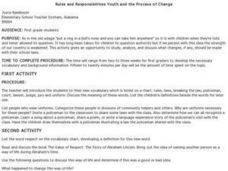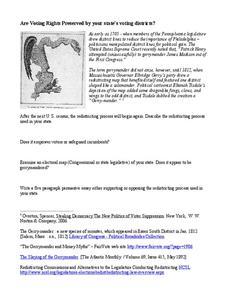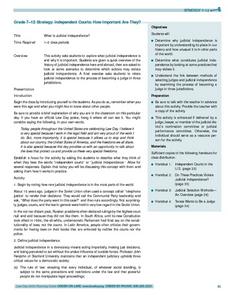Judicial Learning Center
The Players in the Courtroom
Courtrooms are complicated. In addition to the many rules, there are a number of people whose jobs are not very clear to the casual courtroom observer. With the resource, individuals identify some of these roles and review more...
American Documentary
The Benefits and Drawbacks of Plea Bargains
The outcome of 90 percent of criminal cases in the US is determined by plea bargains. Clips from the documentary Better This World create the backdrop for an investigation of the benefits and drawbacks of the plea bargaining process....
Curated OER
You and the Judicial System
Learners explore how the structure of the state and federal judicial systems affect them. They select an appropriate media and create a presentation on the structure of the judicial system, the criminal judicial system and a guide to the...
Curated OER
Tort Liability: Mock Trial
Students explore the trial process and the tort concept of host liability.
Curated OER
What Makes a Good Judge?
Students define qualities that should be considered when selecting judge, evaluate costs and benefits of two methods of selecting and retaining judges, decide whether methods provide for judicial independence
and judicial accountability,...
Judicial Learning Center
Your 4th Amendment Rights
Americans love to learn about their rights, especially those that protect them from the government's power to invade their privacy. Young people are especially engaged by this topic. An informative lesson explores four Supreme Court...
Judicial Learning Center
Why Study Landmark Cases?
Why study landmark Supreme court cases? A helpful lesson offers a brief but valuable argument for the importance of these cases in the field of criminology. It introduces scholars to some key terms necessary for studying court cases and...
Judicial Learning Center
The Constitution and Rights
What's the right way to teach young historians about the Bill of Rights? Many an instructor has asked this question when pondering lesson plans over the US Constitution. The Constitution and Rights is a nifty resource that provides a...
Curated OER
Rules and Responsibilities Youth and the Process of Change
First graders learn vocabulary in regards to laws, courts, and policeman. They read and discuss the book, The Value of Respect: The Story of Abraham Lincoln. An attorney visits the classroom and discusses the roles of judges and juries.
State Bar of Texas
Miranda v. Arizona
You have the right to remain silent—but why? Scholars analyze the nature of what has become known as the Miranda Rights. A short video along with paired group work and discussion opens the issue of the rights of the accused upon arrest....
Curated OER
Building a Model Courtroom
Students construct a model of the Supreme Court's courtroom. They design the courtroom in such a way so that the architecture and furnishings in the courtroom represent the neutrality and power of the court.
Curated OER
Mock Trial
Students rewrite a traditional fairy tale to represent the viewpoint of the villain. They participate in a mock trial of that villain in which all regular court participants (judge, jury, defendant, witnesses, plaintiff, etc) play roles.
Curated OER
Why a Mock Trial?
Learners participate in a mock trial. They discover how U.S. courts resolve conflicts.
Curated OER
Supreme Court
Eleventh graders explore the redistricting process. In this American Government lesson, 11th graders examine the electoral map. Students write an essay posing an argument for the redistricting process.
Curated OER
Plea Bargaining
Students explore plea bargaining and list the advantages and disadvantages of it.
Curated OER
Judges in the Classroom
Students study the court process by participating in a mock trial. They demonstrate an understanding of the tort concept of host liability for injuries to third parties.
Curated OER
THE JUDICIAL BRANCH
Students create a series of drawings to show the process of how the Supreme Court does its work. The drawings may be in strip cartoon form or a series of separate illustrations.
Curated OER
Moot Court Preparation
Twelfth graders prepare themselves for a mock moot court. In groups, they are presented with an overview of each activity and research appellate cases related to the topic given to them. They identify regions of the country that have...
Curated OER
Affirmative Action
Young scholars explore policies concerning affirmative action. After reading affirmative action handouts, students use the internet and other resources to research information about affirmative action laws, court cases, and arguments....
Curated OER
Understanding the Significance of the Nationalization of the Bill of Rights
Eleventh graders study the impact of the Nationalization of the Bill of Rights upon criminal law. They analyze opposition to expansionist viewpoints that could possibly create more checks and balances on the state courts and analyze...
Curated OER
Bill of Rights and Lawmaking
Ninth graders consider how the Bill of Rights impacts the lawmaking process in the United States. In this Bill of Rights lesson plan, 9th graders discuss the amendments and their limitations. Students research the role of the Legislative...
Curated OER
Independent Courts: How Important Are They?
High schoolers investigate the importance of judicial independence and how it is exercised while conducting research to gather information using different resources. The teacher discusses the importance of Law Day. They also read the...
Curated OER
The Jury System
Students analyze Article III and the Seventh Amendment. In this US Justice lesson plan, students research the US jury system and complete a Student Jury questionnaire. Students will discuss the impact the implementation of the Jury...
Curated OER
The Legal Challenge of Human Rights Protection
Students identify the types and extent of human rights violations that occurred in El Salvador . They will also analyze the various laws and statutes that dictate the processes to protect and punish war crimes and human rights...

























